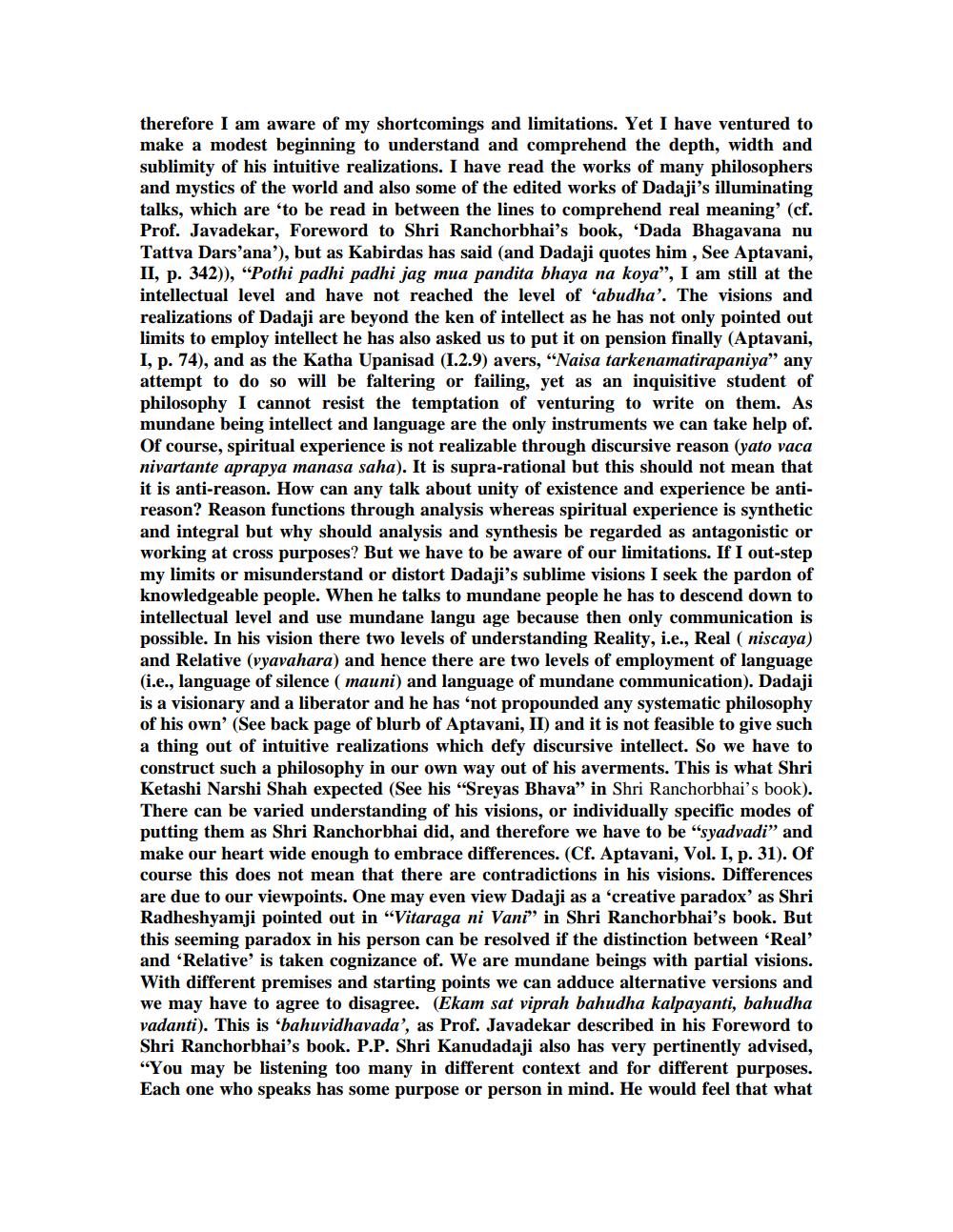________________
therefore I am aware of my shortcomings and limitations. Yet I have ventured to make a modest beginning to understand and comprehend the depth, width and sublimity of his intuitive realizations. I have read the works of many philosophers and mystics of the world and also some of the edited works of Dadaji's illuminating talks, which are to be read in between the lines to comprehend real meaning' (cf. Prof. Javadekar, Foreword to Shri Ranchorbhai's book, 'Dada Bhagavana nu Tattva Dars'ana'), but as Kabirdas has said (and Dadaji quotes him , See Aptavani, II, p. 342)), "Pothi padhi padhi jag mua pandita bhaya na koya", I am still at the intellectual level and have not reached the level of 'abudha'. The visions and realizations of Dadaji are beyond the ken of intellect as he has not only pointed out limits to employ intellect he has also asked us to put it on pension finally (Aptavani, I, p. 74), and as the Katha Upanisad (1.2.9) avers, "Naisa tarkenamatirapaniya" any attempt to do so will be faltering or failing, yet as an inquisitive student of philosophy I cannot resist the temptation of venturing to write on them. As mundane being intellect and language are the only instruments we can take help of. Of course, spiritual experience is not realizable through discursive reason (yato vaca nivartante aprapya manasa saha). It is supra-rational but this should not mean that it is anti-reason. How can any talk about unity of existence and experience be antireason? Reason functions through analysis whereas spiritual experience is synthetic and integral but why should analysis and synthesis be regarded as antagonistic or working at cross purposes? But we have to be aware of our limitations. If I out-step my limits or misunderstand or distort Dadaji's sublime visions I seek the pardon of knowledgeable people. When he talks to mundane people he has to descend down to intellectual level and use mundane langu age because then only communication is possible. In his vision there two levels of understanding Reality, i.e., Real ( niscaya) and Relative (vyavahara) and hence there are two levels of employment of language (i.e., language of silence (mauni) and language of mundane communication). Dadaji is a visionary and a liberator and he has not propounded any systematic philosophy of his own' (See back page of blurb of Aptavani, II) and it is not feasible to give such a thing out of intuitive realizations which defy discursive intellect. So we have to construct such a philosophy in our own way out of his averments. This is what Shri Ketashi Narshi Shah expected (See his "Sreyas Bhava" in Shri Ranchorbhai's book). There can be varied understanding of his visions, or individually specific modes of putting them as Shri Ranchorbhai did, and therefore we have to be "syadvadi" and make our heart wide enough to embrace differences. (Cf. Aptavani, Vol. I, p. 31). Of course this does not mean that there are contradictions in his visions. Differences are due to our viewpoints. One may even view Dadaji as a 'creative paradox' as Shri Radheshyamji pointed out in "Vitaraga ni Vani" in Shri Ranchorbhai's book. But this seeming paradox in his person can be resolved if the distinction between "Real' and Relative' is taken cognizance of. We are mundane beings with partial visions. With different premises and starting points we can adduce alternative versions and we may have to agree to disagree. (Ekam sat viprah bahudha kalpayanti, bahudha vadanti). This is 'bahuvidhavada', as Prof. Javadekar described in his Foreword to Shri Ranchorbhai's book. P.P. Shri Kanudadaji also has very pertinently advised, "You may be listening too many in different context and for different purposes. Each one who speaks has some purpose or person in mind. He would feel that what




